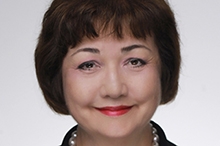Helping Refugees Thrive, not just Survive

Anna Crosslin is being honored as a White House Champion of Change for World Refugees.
According to the United Nations High Commissioner for Refugees, the world is presently facing the most serious displacement crisis on record. Nearly 60 million people are residing outside their homeland or are internally displaced. Much of the dramatic growth is attributable to the Syrian crisis.
In recent years, approximately 70,000 refugees have been resettled annually in America with 600 sponsored to St. Louis by my organization, the International Institute of St. Louis (IISTL). While some relocate to other communities after arrival, St. Louis has also benefited from secondary migration of refugees from other U.S. cities, sometimes in significant numbers, like Bosnian refugees in the past two decades.
Resettling refugees is a win-win for the refugees, themselves, and for communities which welcome them. Refugees are offered a safe haven and a chance to begin again in a more secure environment. Cities like St. Louis benefit from a source of new population and entrepreneurs, both imperatives for success in today’s economy.
Offering refugees a safe haven in America is merely the first step. An array of easily accessible transitional services is essential for timely and effective integration. For 37 years, I have led the International Institute of St. Louis, working to ease the transition of immigrants and refugees. IISTL is St. Louis’ Welcome Center, serving 7,500 immigrants and refugees annually from 80 countries.
In addition to serving as Missouri’s largest refugee resettlement program, IISTL is also St. Louis’ largest site for English classes with 1,300 students as well as St. Louis’ immigrant employment center with 500 job placements annually. IISTL programs offer micro-lending and financial education. In all, IISTL has helped start or expand more than 600 refugee-owned businesses since 1999 with a positive economic impact of $160 million.
We do not have all the answers, nor are services perfect at IISTL. However, I have a couple of observations. First and foremost, the one-stop service approach we use in St. Louis has eased the access of refugees to core AND supplemental services. And language classes are more easily accessible.
Second, we cannot effectively resettle refugees if we, the thought leaders in the field, do not educate our communities about inclusive immigrant integration. We must work to encourage our elected officials, corporate leaders, and faith communities to engage newcomers in culturally and linguistically appropriate ways. It is essential that we create welcoming communities which include numerous local residents who appreciate newcomers and actively engage in integrating them into community life.
To that end I have worked with area leaders to found and operate the St. Louis Mosaic Project. Mosaic is a nationally recognized multi-sector led immigration attraction initiative affiliated with Welcoming America. The initiative aims to make St. Louis the “…fastest growing major metro for immigrants by 2020.” Mosaic is our immigrant attraction mechanism; IISTL is the retention component. Together both are building a stronger more vibrant community for all, new arrivals and long-time residents alike.
Born in Tokyo and raised in America, I am uniquely aware of the challenges that language and culture present to refugee newcomers. As a Japanese-American, I grew up with a foot in two cultures, in two worlds. My American-born father was an Air Force linguist; my mom was a Japanese national who struggled to learn English and achieve U.S. Citizenship. Widowed early, Mom, out of necessity, became a restaurateur, meanwhile raising four children, all of whom are college graduates. Mom, with help, embraced the American Dream, and refugees today can continue to do so as well…with the right array of supportive services at the right time.
Anna Crosslin has served as President and CEO of the International Institute of St. Louis (IISTL) for nearly 37 years.
White House Blogs
- The White House Blog
- Middle Class Task Force
- Council of Economic Advisers
- Council on Environmental Quality
- Council on Women and Girls
- Office of Intergovernmental Affairs
- Office of Management and Budget
- Office of Public Engagement
- Office of Science & Tech Policy
- Office of Urban Affairs
- Open Government
- Faith and Neighborhood Partnerships
- Social Innovation and Civic Participation
- US Trade Representative
- Office National Drug Control Policy
categories
- AIDS Policy
- Alaska
- Blueprint for an America Built to Last
- Budget
- Civil Rights
- Defense
- Disabilities
- Economy
- Education
- Energy and Environment
- Equal Pay
- Ethics
- Faith Based
- Fiscal Responsibility
- Foreign Policy
- Grab Bag
- Health Care
- Homeland Security
- Immigration
- Innovation Fellows
- Inside the White House
- Middle Class Security
- Open Government
- Poverty
- Rural
- Seniors and Social Security
- Service
- Social Innovation
- State of the Union
- Taxes
- Technology
- Urban Policy
- Veterans
- Violence Prevention
- White House Internships
- Women
- Working Families
- Additional Issues

